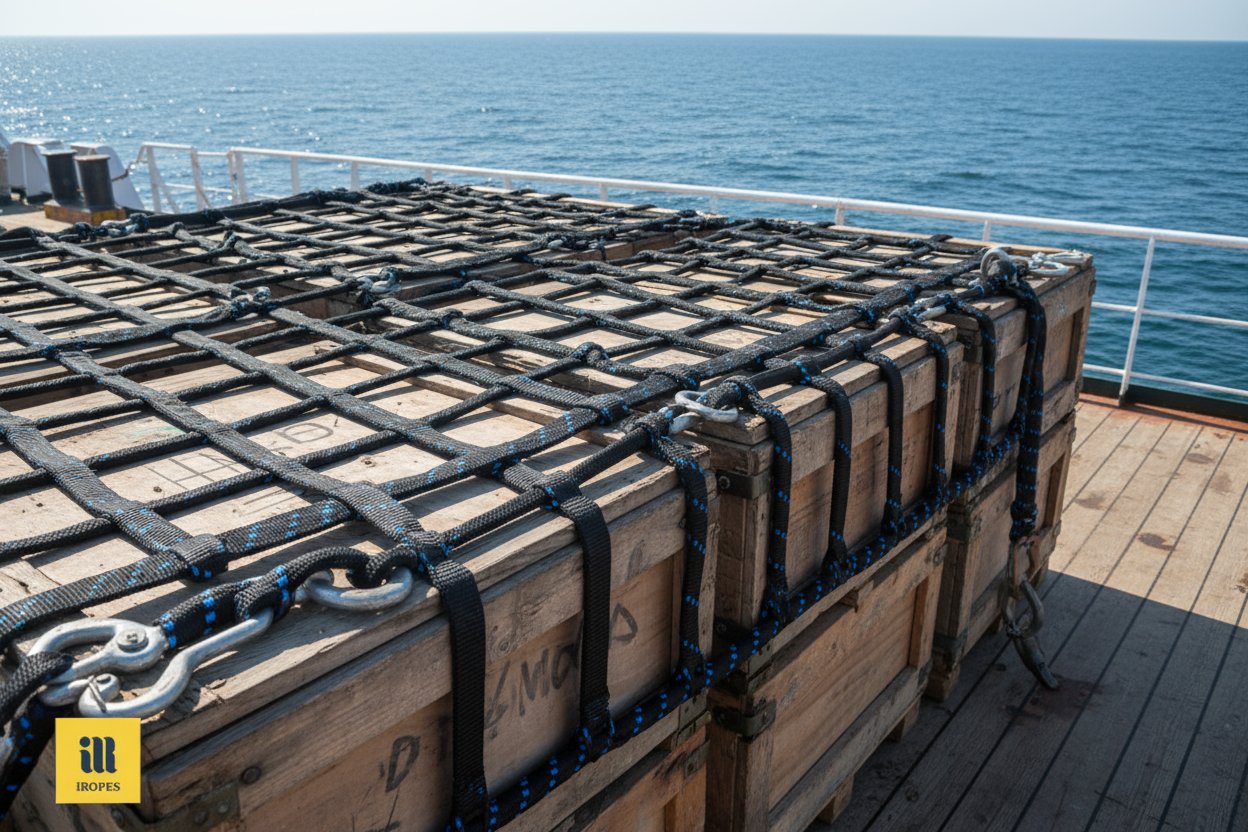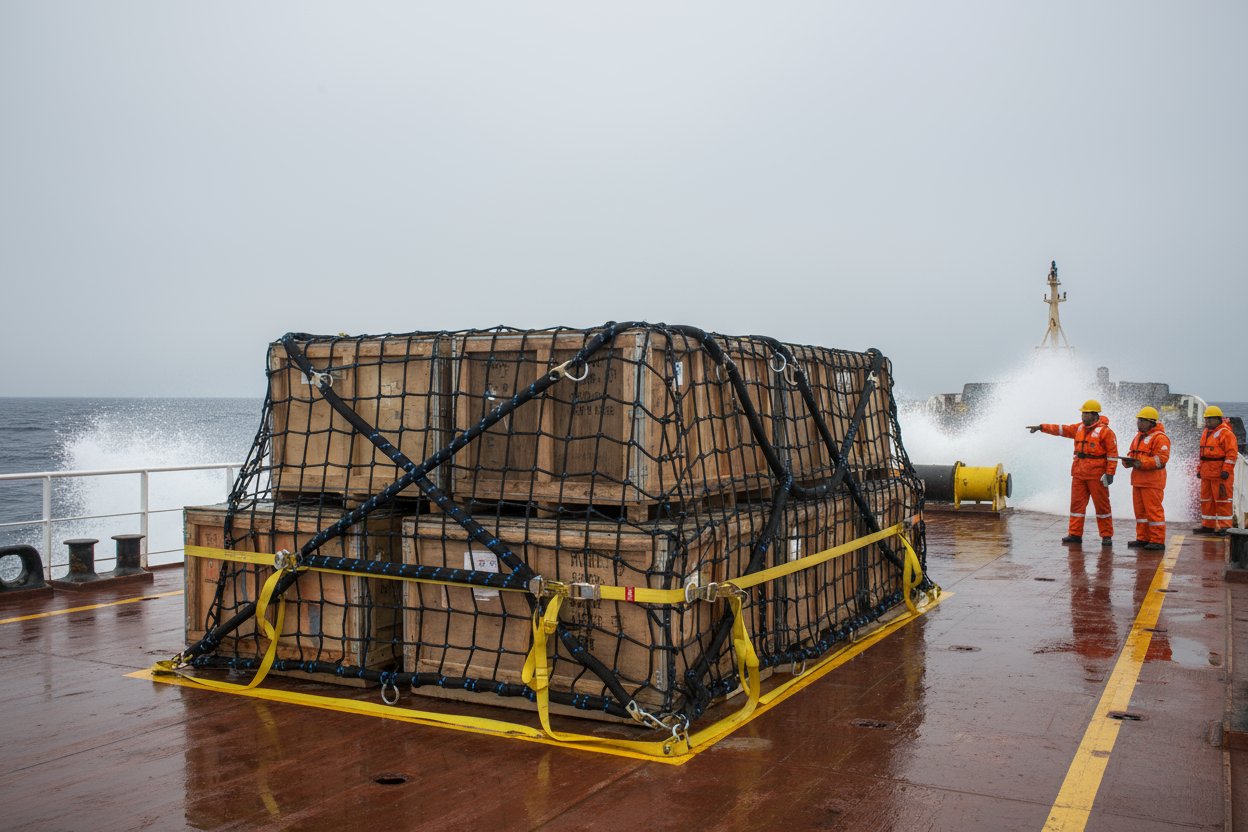Hybrid rope nylon cargo nets outperform pure webbing by delivering 35% superior shock absorption in rough seas, securely handling loads from 0.15T to 3T with minimal stretch—transforming risky marine freight into reliable operations.
Grasp hybrid advantages in 6 minutes flat →
- ✓ Boost shock resistance to absorb 2,000+ kg impacts without sagging.
- ✓ Achieve even load spread that cuts strain hotspots by 40% on decks.
- ✓ Gain abrasion-proof edges extending net lifespan in saltwater by 50%.
- ✓ Tailor for VDI 2700 compliance, solving custom breakbulk challenges.
You might assume pure nylon webbing nets suffice for their featherlight hold and rot resistance in marine freight. But why do hybrids quietly dominate, with rope reinforcements that slash failure risks? Picture your breakbulk cargo locked tight amid swells, only to find uneven distribution turns minor jolts into disasters. What precise, counterintuitive tweaks make hybrids the resilient choice professionals swear by? Uncover the engineering that elevates your cargo securing game and prevents costly disruptions ahead.
Understanding Rope Cargo Nets in Marine Applications
In the challenging world of marine freight, where waves crash relentlessly and cargo shifts with every swell, rope cargo nets stand as a time-tested barrier against chaos. These nets are essentially interconnected ropes, knotted or woven into a mesh pattern, designed to envelop and secure loads on ship decks or in holds. Traditional construction often relies on robust materials like poly dacron—a blend of polyester and cotton that delivers exceptional durability.
This synthetic fibre resists the corrosive punch of saltwater and withstands the abrasion from constant motion in rough seas, making it a staple for vessels navigating stormy routes. What sets rope cargo nets apart are their core traits: impressive tensile strength that handles heavy pulls without snapping, paired with enough flexibility to conform to irregular shapes. Imagine breakbulk cargo—those oddly sized crates and machinery pieces stacked haphazardly on deck. A well-made rope net wraps around them snugly, distributing force across multiple points to prevent slippage during transit. This combination ensures loads stay put, even as the ship pitches in high winds, safeguarding both crew and goods from potential mishaps.

Have you ever wondered about the variety of cargo nets available? Beyond the basics, they come in several forms, with rope variants leading for heavy-duty marine work. There's the classic knotted rope net, built from thick strands for maximum grip on loose items like lumber or pipes. Then there are twisted rope designs, offering a smoother weave for quicker deployment. Historically, these nets trace back to early seafaring days, when sailors used hemp ropes to lash down provisions; a practice refined over centuries into today's poly dacron versions for deck cargo operations. While other types include chain nets for ultra-heavy lifts or mesh panels for lighter containment, rope options dominate where raw strength meets the ocean's fury.
That said, rope cargo nets aren't without their challenges in wet conditions. When saturated, they can elongate under pressure, leading to sagging that compromises their hold. Load distribution might also falter at knot points, concentrating stress and risking tears over time. These issues highlight why innovations in design keep evolving, particularly by blending traditional ropes with modern elements to boost overall reliability.
- Knotted Rope Net – Ideal for irregular breakbulk, with strong holds at intersections but potential for wear at ties.
- Twisted Rope Variant – Smoother for fast setup in deck operations, balancing strength and ease.
- Hybrid Rope Types – Emerging blends that address stretch, though still rooted in historical durability.
While rope cargo nets provide robust foundational support, exploring nylon webbing integrations reveals opportunities for enhanced performance in hybrid designs.
Exploring Nylon Webbing Net Construction and Properties
Building on the solid base of traditional rope cargo nets, nylon webbing takes things a step further by introducing a flatter, more uniform structure that's particularly suited to the unpredictable demands of marine freight. Instead of thick ropes knotted together, a nylon webbing net consists of flat, woven straps seamlessly connected into a grid-like mesh. This design creates a smoother surface that hugs cargo without the bulk, making it easier to deploy and adjust on a pitching deck.
One of the standout features of a nylon webbing net is its lightweight build. This doesn't sacrifice reliability; in fact, it enhances it for everyday marine use. These nets resist UV rays—which can degrade lesser materials over long exposures at sea—and they offer controlled stretch, meaning they give just enough under tension to absorb minor shocks without excessive sagging. In saltwater environments, where constant moisture is a fact of life, this controlled behaviour keeps your loads stable without the dramatic elongation sometimes seen in pure rope setups.
When it comes to what nylon webbing cargo nets are actually made of, they’re crafted from high-tenacity nylon fibres. These are woven into durable flat straps, typically around 25mm wide, then stitched or heat-sealed at intersections for a secure hold. This construction gives them impressive tensile strength, often exceeding 2,000 kg per strap, allowing safe load capacities ranging from 0.15 tonnes for lighter freight up to 3 tonnes for heavier breakbulk items. It's this balance of power and precision that makes them a go-to for professionals handling everything from machinery to containers.
Nylon Webbing Strengths
Key Properties for Marine Use
Rot Resistance
Nylon stands out against saltwater corrosion, preventing mildew that plagues natural fibres like cotton blends in poly dacron.
UV Durability
Unlike basic polyester, nylon maintains integrity under prolonged sun exposure, crucial for open-deck shipments.
Even Load Spread
The wide straps distribute weight uniformly, outperforming rope's point-load risks in wet conditions.
Vs Other Materials
Why Nylon Excels
Over Poly Dacron
Less prone to mildew in humid holds, while matching durability without added weight from cotton components.
Vs Polyester Alone
Offers better flexibility and shock handling, reducing wear from waves compared to stiffer polyester nets.
Drawback Note
Absorbs less sudden impacts than rope, which is why hybrids often pair it for ultimate resilience.
In industrial securing, these nylon webbing cargo nets shine for tasks like pallet containment in warehouses or lashing down equipment on transport vehicles. Their compact foldability speeds up operations. They're especially handy for logistics professionals dealing with varied loads, providing quick setups that comply with basic safety norms without the hassle of heavier alternatives. Yet, for scenarios with extreme jolts—like rogue waves slamming a deck—pure nylon might not cushion as well as a rope-enhanced version, hinting at the value of blended approaches.
Ever handled gear on a boat and felt the frustration of a net that bunches up? Nylon's smooth profile avoids that, but pairing it with rope elements can take load handling to the next level in tough marine conditions.

Why Nylon Webbing Cargo Net Hybrids Outperform Pure Webbing
Building on the even load spread that nylon webbing nets provide so well, hybrid versions take that foundation and reinforce it with targeted rope elements. This creates a setup that's far more resilient in the unpredictable world of marine freight. These nylon webbing cargo net hybrids merge the flat, woven straps of pure nylon with strategically placed rope sections—think durable poly dacron lines woven into the edges or crossing key stress points. This blend isn't just additive; it delivers superior shock absorption by letting the rope handle sudden jolts from waves while the webbing maintains a taut, uniform hold. The result? A net that flexes without failing, adapting to the roll of a ship without losing grip on your cargo below deck or above.
In practice, this construction shines through optimized load distribution. Broader webbing widths spread weight evenly across surfaces, and rope reinforcements add localised strength to prevent hotspots. For deck cargo exposed to constant spray and motion, this reduces strain dramatically—imagine heavy crates of machinery shifting less under tension, cutting down on wear that could lead to tears or slips. Hybrids cut that risk by balancing the two materials, ensuring the net conforms to odd shapes without the bunching sometimes typical of standalone webbing.
Load Strain Reduction
Rope boosts prevent webbing overload in high-impact zones, easing pressure on deck loads during rough passages.
Enhanced Flexibility
The combo allows natural give under waves, avoiding the rigidity that pure webbing sometimes shows in extremes.
Abrasion Resistance
Hybrid edges withstand rubbing against metal or wood better than plain nylon, extending net life in abrasive marine settings.
Minimal Stretch
Rope limits elongation, keeping the overall structure tight even when wet, unlike traditional rope's more variable give.
So, what makes nylon webbing cargo net hybrids outperform traditional rope cargo nets and even pure webbing forms? The key advantages lie in that controlled, minimal stretch. Hybrids avoid the sagging pure nylon might allow under prolonged tension while offering better abrasion resistance through rope's tougher outer layer. This makes them ideal for breakbulk operations, where varied items like pipes or pallets need secure lashing without constant adjustments. Over straight rope setups, hybrids add the webbing's lighter profile for easier handling, all while ramping up resistance to the grind of saltwater and deck friction.
When it comes to securing these hybrids, methods like attaching D-rings at corners paired with ratchet straps create a form-fitting hold that meets VDI 2700 standards for cargo lashing. These guidelines ensure forces are distributed safely, preventing overloads in breakbulk scenarios. Ratchets tighten precisely, while D-rings anchor to deck fittings without slipping. It's a straightforward setup that professionals rely on for compliance, turning potential hazards into reliable containment. As demands vary by vessel or load type, fine-tuning these elements through custom tweaks can push performance even further.

Customising Hybrid Cargo Nets for Marine Freight Operations
As demands vary by vessel or load type, fine-tuning these elements through custom tweaks can push performance even further. That's where iRopes steps in with their OEM and ODM services, turning standard hybrid designs into perfectly suited tools for your specific marine needs. Whether you're dealing with oversized machinery or fragile components, these services allow for precise adjustments that enhance safety and efficiency without compromising on the core benefits of shock absorption and even load spread.
Picture a logistics manager facing irregular breakbulk items on a container ship. Custom hybrids can be engineered with varying mesh sizes—from 10cm squares for smaller cargo to larger 15cm openings for bulkier loads—ensuring nothing slips through while allowing ventilation. Rope diameters might be specified at 12mm for high-tension areas, paired with 25mm nylon straps for broader coverage. For branding, colours like safety orange or company-specific blues integrate seamlessly, making your gear instantly recognisable on deck. Yes, cargo nets can absolutely be custom-made; iRopes' specialists collaborate from initial sketches to prototypes, protecting your intellectual property throughout to keep designs confidential for your competitive edge.
- Consultation – Share your load specifications and environmental challenges.
- Design Phase – Select mesh, diameters, and fittings like reinforced edges.
- Prototyping – Test for compliance and performance in simulated sea conditions.
- Production – Scale up with your branding and IP safeguards.
In breakbulk and deck cargo scenarios, these tailored hybrids prove their worth, especially in harsh weather where sudden gusts or swells test every lash. Take a recent case with a European shipping firm: they needed nets for securing wind turbine parts across the Atlantic. iRopes crafted hybrids with UV-stabilised nylon sections and poly dacron rope borders, which held firm through a storm, preventing any shifts that could have caused delays or damage. Nylon webbing cargo nets find broad use here, from yacht decking to industrial port handling, always prioritising logistics flow in high-stakes environments.

To keep these nets performing over years of global shipping routes, simple maintenance goes a long way. Rinse off salt buildup with fresh water after each voyage and inspect for frays during downtime. Store them coiled in a dry spot to avoid mildew, and avoid exposure to sharp edges that could nick the webbing. Backed by iRopes' ISO 9001 certification, every custom piece undergoes rigorous testing for tensile integrity and environmental resilience, ensuring they meet the demands of international trade without unexpected failures.
Hybrid rope nylon cargo nets revolutionise marine freight by surpassing pure nylon webbing nets through superior shock absorption and minimal stretch. They blend the durability of rope cargo nets with the even load distribution of nylon webbing cargo net designs. In breakbulk and deck cargo operations, these hybrids optimise securing methods like D-rings and ratchet straps, ensuring compliance with VDI 2700 standards while reducing strain in harsh seas. iRopes' OEM/ODM expertise allows customisation of mesh sizes, materials, and branding, enhancing safety and efficiency for global shipping demands backed by ISO 9001 quality assurance.
These innovations not only address traditional limitations like elongation in wet conditions but empower logistics teams with reliable cargo containment that adapts to irregular loads and unpredictable weather.
Explore Custom Hybrid Solutions for Your Marine Needs
If you're ready to tailor hybrid cargo nets to your specific operations and want personalised guidance from iRopes experts, simply complete the inquiry form above. We're here to help secure your freight effectively.























